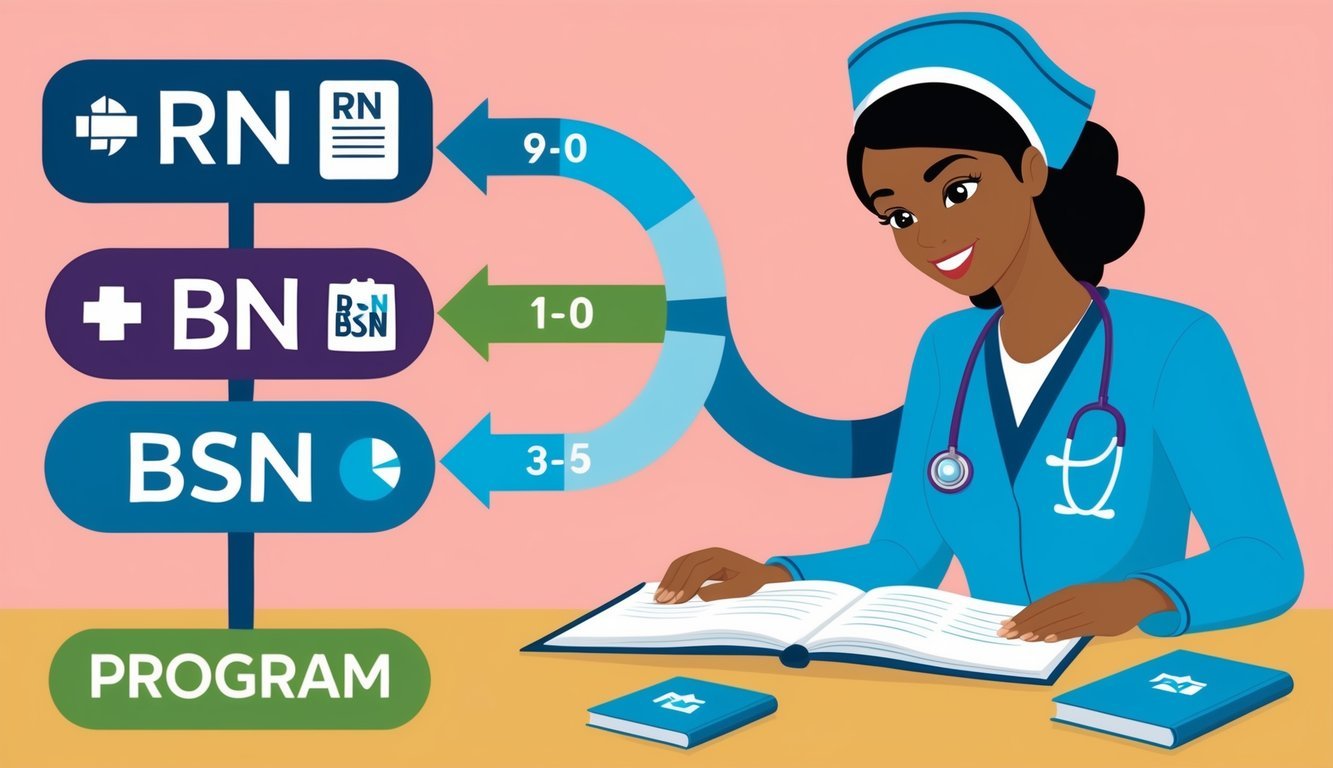When considering advancing your nursing career, you may wonder about the duration of an RN to BSN program.
Typically, you can complete an RN to BSN program in as little as 12 months or take up to 5 years, depending on various factors such as the program structure and your personal commitments.
The flexibility of online programs allows you to balance studies with professional and personal responsibilities, making this path increasingly accessible.
The choice of institution also plays a significant role in determining the length of the program.
Many schools offer accelerated options, while others provide part-time tracks to accommodate your work schedule.
As you explore your options, consider programs like those outlined in resources such as Forbes Advisor and Nurse.org for insights on different pathways available.
In addition to program duration, being aware of admission requirements and costs is crucial.
Many RN to BSN programs require a minimum GPA and possibly other prerequisites.
Understanding these factors will help you make an informed decision on how to proceed with your nursing education journey.
Understanding RN to BSN Programs

RN to BSN programs are designed for registered nurses who want to enhance their qualifications and career prospects.
These programs offer a pathway to earning your Bachelor of Science in Nursing (BSN) degree while building upon your existing nursing experience.
Defining the RN to BSN Pathway
The RN to BSN pathway allows registered nurses (RNs) to transition from an associate degree or diploma to a BSN.
Typically, these programs recognize the competencies you’ve already developed.
Most RN to BSN programs include core courses in areas such as:
- Healthcare Policy
- Nursing Research
- Professional Nursing Theory
- Global Health
Completion times vary based on your enrollment status.
Full-time students often finish in 2 to 3 years, while part-time options can take 3 to 4 years.
Many programs also offer online formats for flexibility, allowing you to balance work and study effectively.
For more detailed timelines, check how long RN to BSN programs typically take.
Benefits of Earning a BSN Degree
Earning a BSN offers several advantages for your nursing career.
Studies show that BSN-prepared nurses tend to have better patient outcomes.
Key benefits include:
- Enhanced Skills: BSN programs provide in-depth knowledge of nursing ethics, research, and informatics, preparing you for complex healthcare environments.
- Career Opportunities: Many healthcare facilities now prefer or require a BSN for management positions and specialized roles.
- Higher Earning Potential: BSN graduates often enjoy higher salaries than those with only an associate degree.
By pursuing a BSN, you gain not only a degree but also a competitive edge in the evolving healthcare landscape.
Check more about the benefits on Nurse.org.
Program Structure and Curriculum

Understanding the program structure and curriculum of RN to BSN programs is essential for prospective students.
The curriculum is designed to enhance nursing theory and practice, building on your existing knowledge.
Coursework in RN to BSN Programs
The coursework in RN to BSN programs typically includes a combination of core nursing classes, general education courses, and electives.
You will study subjects such as nursing theory, nursing research, and healthcare policy.
Common coursework may include:
- Health Assessment
- Nursing Informatics
- Ethics in Nursing
- Community and Public Health Nursing
Prerequisite courses may be required and usually cover topics like anatomy, microbiology, and statistics.
You will also engage in projects that necessitate critical thinking and evidence-based practice, solidifying your understanding of the principles necessary for advanced nursing roles.
Clinical Requirements for BSN Students
Clinical practice is a crucial part of the RN to BSN program.
You will need to complete a specified number of clinical hours in various healthcare settings.
These hours allow you to apply theoretical knowledge in real-world situations.
You may be responsible for:
- Conducting patient assessments
- Implementing care plans
- Collaborating with healthcare teams
Clinical experiences often vary by program but generally require you to demonstrate competence in nursing skills.
These hands-on opportunities will enhance your skills and prepare you for complex patient needs, bridging the gap between education and practice.
Admission and Program Requirements
When considering an RN to BSN program, it’s essential to understand the specific admission and program requirements.
You will typically encounter stipulations regarding your academic performance, licensure status, and the potential for transferring credits.
Minimum GPA and Prerequisites
Most RN to BSN programs have a minimum GPA requirement for admission, generally ranging between 2.5 and 3.0 on a 4.0 scale.
This metric ensures that you have a solid academic foundation.
In addition to GPA, many programs require you to have completed certain prerequisite courses, which can include subjects like statistics, psychology, or anatomy.
You should expect to provide documentation of these courses during the application process.
Each program may have varying prerequisites, so it’s crucial to review the specific requirements of the school you’re interested in.
Many institutions also allow for online completion of these prerequisites, making it more convenient for you.
Licensure and Background Checks
To apply for an RN to BSN program, you must hold an active registered nurse (RN) license.
This requirement verifies that you have met the foundational nursing standards and are legally permitted to practice nursing.
Additionally, a criminal background check is often mandated.
This is to ensure the safety of patients and uphold the integrity of the nursing profession.
Some programs may ask you to submit proof of your licensure along with the background check results as part of the admission process.
Transfer Credits and Previous Education
If you have previously attended college or another nursing program, you may have the opportunity to transfer credits toward your RN to BSN degree.
Many programs allow you to transfer credits for nursing courses you have already completed successfully; however, this is subject to the program’s specific policies.
You might need to provide syllabi and course descriptions to facilitate the evaluation of your previous coursework.
Here’s a brief overview of what to consider regarding transfer credits:
| Aspect | Details |
|---|---|
| Eligible Courses | Nursing courses from accredited programs |
| Credit Transfer Assessment | Syllabi and course descriptions may be required |
| Maximum Transfer Limit | Varies by institution |
Be sure to check with your prospective school about their policies concerning transfer credits to maximize your prior educational efforts.
Online RN to BSN Programs
Online RN to BSN programs offer flexible options that cater to the busy schedules of registered nurses.
These programs allow you to balance work, study, and personal commitments while advancing your education.
Here are key aspects to consider when exploring these online opportunities.
The Flexibility of Online Learning
One of the main advantages of pursuing an online RN to BSN degree is the flexibility it provides.
Many programs, such as those offered by WGU and Purdue Global, are designed for working professionals.
You can complete your coursework at your convenience, allowing you to study during evenings or weekends.
Most programs do not require you to attend classes in person, making them ideal for distance learners.
Additionally, online classes often allow you to work at your own pace, which means you can accelerate your studies if you have more time or slow down when necessary.
This approach is particularly beneficial for students balancing full-time jobs or family commitments.
Selecting an Accredited Online Program
When choosing an online RN to BSN program, it’s crucial to select one that is properly accredited.
Programs accredited by the Commission on Collegiate Nursing Education (CCNE) or the Accreditation Commission for Education in Nursing ensure that the education you receive meets high standards.
Check if your selected program holds this accreditation to guarantee the quality of your education.
Additionally, research the program’s curriculum, faculty qualifications, and student support services.
Reviewing student feedback can also give you insight into the program’s effectiveness.
Ensure that the program supports your career goals and offers resources such as academic advising and networking opportunities.
Career Advancement and Opportunities
Pursuing a BSN opens various avenues for career advancement in nursing.
With this degree, you not only enhance your job security but also gain access to positions that require advanced training and expertise.
The following explores the career paths, leadership roles, and further educational opportunities available to BSN-prepared nurses.
Nursing Career Paths with a BSN
A BSN equips you to pursue diverse nursing roles.
Many employers, especially Magnet hospitals, prefer or require BSN-prepared nurses.
This preference is linked to improved patient outcomes and overall healthcare quality.
Common paths include:
- Registered Nurse (RN): Direct patient care in hospitals or clinics.
- Nurse Educator: Teaching the next generation of nurses in educational institutions.
- Clinical Nurse Leader: Coordinating care for patients and managing healthcare teams.
Each path can lead to improved job stability and opportunities for advancement.
Leadership and Specializations
With a BSN, you can enter various leadership roles, enhancing your scope of practice.
BSN-prepared nurses are often positioned for management and supervisory roles.
Possible leadership opportunities include:
- Nurse Manager: Overseeing nursing staff and operations.
- Clinical Coordinator: Ensuring that patient care protocols are followed.
- Director of Nursing: Assuming administrative responsibilities in healthcare settings.
Specializations like critical care, oncology, or pediatrics are also accessible.
These roles often come with increased salary potential and professional recognition.
Further Education: Master’s and Beyond
The BSN also serves as a foundation for advanced degrees.
Pursuing a Master’s in Nursing can elevate your career further.
Options for advanced degrees include:
- Master of Science in Nursing (MSN): Prepares you for roles such as Nurse Practitioner or Nurse Anesthetist.
- Doctor of Nursing Practice (DNP): Focuses on applying research for improved patient outcomes.
Continuing your education can lead to enhanced job opportunities and higher salaries.
Investing in further education not only strengthens your career potential but also positions you as a leader among healthcare professionals.
Financial Considerations and Support

When planning for an RN to BSN program, it’s essential to recognize the costs and explore financial support options.
Understanding tuition, associated expenses, and available financial aid can help you make informed decisions.
Tuition and Associated Costs
The cost of an RN to BSN program varies significantly based on the institution you choose.
Below is a summary of typical tuition costs:
| Institution Type | Estimated Tuition Range |
|---|---|
| Public Universities | $7,000 – $25,000 |
| Private Colleges | $20,000 – $50,000 |
| Online Programs | $8,000 – $35,000 |
In addition to tuition, you should consider other associated costs such as books, supplies, and fees.
These can total anywhere from $500 to $2,000 per year. Transportation for clinical placements may also add to your expenses.
Financial Aid and Scholarships
Numerous financial aid options can alleviate the burden of tuition.
Common choices include federal student loans, grants, and work-study programs.
To maximize assistance, complete the FAFSA (Free Application for Federal Student Aid).
Many institutions also offer scholarships specifically for nursing students.
Some notable scholarships include:
- AANP Foundation Scholarship
- Nursing Scholarship Program from HRSA
- State-specific nursing grants
It’s advisable to research scholarships and apply early, as many have limited availability.
Various resources can help you find scholarships, such as Fastweb and Nursing.org.

